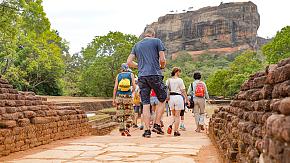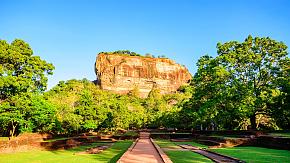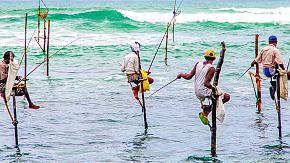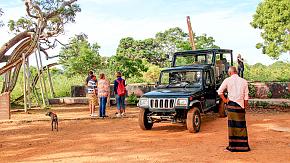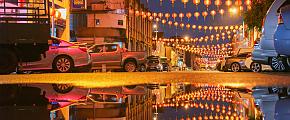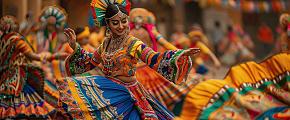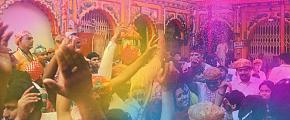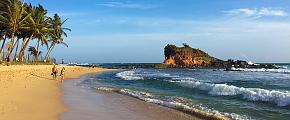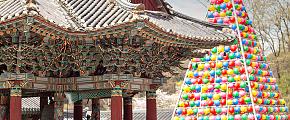15 Best Festivals in Sri Lanka 2026: New Year, Nallur & More
Sri Lanka has 25 public holidays and holy days every year, making it one of the countries with the most public holidays in the world. The festivals in Sri Lanka are rich in religious culture and local historical customs. So, if you want to get an immersive experience of Sri Lanka's culture, come to join their festivals. Here are 15 of the most popular festivals in Sri Lanka to give you a taste of the spectacular Sri Lanka.
Sinhala and Tamil New Year
Every year from the 13th - 14th of April, you may see one of Sri Lanka's largest festivals - the Sinhala and Tamil New Year. They are held by the Buddhists and Hindus around the country and are filled with countless traditions and ceremonies. So, it's one of the best ways to appreciate Sri Lanka fully.
Locals assemble on this day for different rich and entertaining activities such as Kotta Pora (pillow fight), Kamba Aedeema (tug of war), smashing a pot, setting off fireworks, etc. At that time, everyone can participate in the festival events, and the atmosphere is exciting.
Tips:
- To avoid mishaps, paying attention to pedestrians and nearby combustible areas when putting off fireworks is vital.
- Simultaneously, due to the enormous crowds of festival events, if you are a family with children, remember to watch them.
- In addition, traffic may get congested, so plan ahead of time.
Nallur Festival
Nallur Festival is the longest celebration in Sri Lanka, spanning 25 days and taking place at Nallur Kandaswamy Kovil in northern Sri Lanka, one of the most prominent Hindu temples. This event was created to celebrate Lord Murugan, Goddess Valli, and Goddess Deivanai (three Hindu gods). The festival comprises many rituals and events that take place over 25 days.
One of the most impressive activities is transporting Lord Murugan's statue, which is usually escorted by chariots of various shapes. During the march, devotees will sing and be accompanied by musicians and dancers. Cheerful music accompanied by passionate dancing will not disappoint you, allowing you to immerse yourself in the joy of the festival.
It is worth noting that when visiting the temple, visitors must remove their shoes and males must display their upper bodies.
Kandy Esala Perahera
Esala Perahera, another Buddhist celebration, is observed in Kandy each year on Full Moon Day in July or August. And in 2026, it will be celebrated on August 18-28. This festival is an homage to the Sacred Tooth Relic and Sri Lanka's four protector deities: Natha, Vishnu, Kataragama, and Goddess Pattini.
It is generally held as a parade, with dance and music, colorful performances by musicians, dancers, acrobats, and so on, and many elephants decked with gems and costumes.
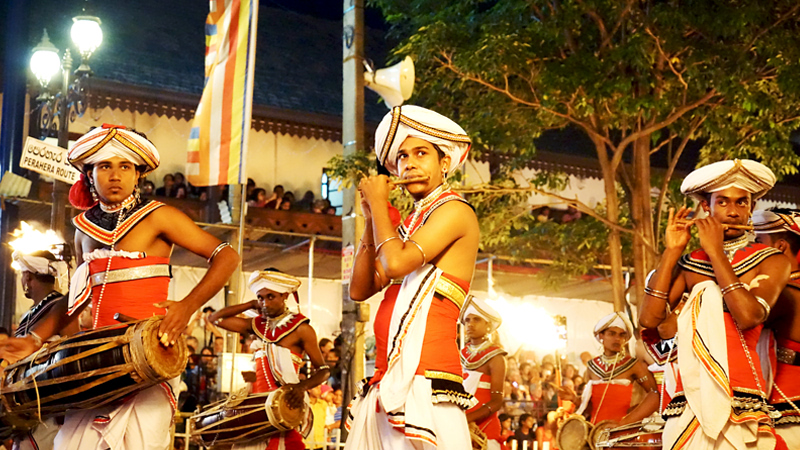 Kandy Esala Perahera
Kandy Esala Perahera
Tips:
- To secure the best spot during the event, you must reserve beforehand.
- The parade area will be monitored daily from 5 to 10 p.m. Motor vehicles are prohibited from entering. Therefore, the route should be planned ahead of time.
- Kandy restricts the consumption of alcohol and the sale of raw meat during the event.
Vesak Poya
Vesak Poya is one of the most important Buddhist celebrations. The festival honors the three most important phases in the life of Sakyamuni, the founder of Buddhism. The festival takes place in May during the Full Moon day. During this time, Buddhist devotees can be seen on both sides of the street handing out free food and drinks to passers-by and going to the temple to perform religious rites and fast on the day.
The most appealing activity for tourists is observing the well-lit Pandals, which need many steps to construct, and showing Buddhist history's profound significance for specific events. Furthermore, colorful lanterns are a highlight, particularly in Colombo, where there will be a lantern exhibition; the objective of lighting lanterns is to reflect the light and magnificence of Buddha. It will also be the most incredible opportunity to learn about Buddhist culture in Sri Lanka.
Colombo Aadi Vel Festival
The Colombo Aadi Vel Festival commemorates Skanda, the Hindu god of war, and his use of his Trident to destroy the demon. Usually, it will take place during the last week of July.
On the festival day, you can see a procession conducted through Colombo's streets. Hindus with ash-covered faces will parade through the streets in gilded chariots, shattering coconuts and lighting joss sticks and candles, accompanied by elephants, drummers, and dancers.
Deepavali
Deepavali is one of the most popular large-scale celebrations in Sri Lanka and is celebrated throughout the country. It will be held on November 8, 2026. The Festival of Lights, often called, represents every family's desire to bring light into their homes and banish darkness from their lives. People also wish to have the favor of Lakshmi, the goddess of riches, and to be able to make money.
Typically, the festival becomes very lively in the Tamil community, with fireworks, gifts exchanged, song and dance performances, family gatherings, visits to temples for worship, and other activities, the most vibrant ritual being the lighting of oil lamps and candles in the houses or along the streets, which illuminates the scene from a distance.
Independence Day of Sri Lanka
Every year on February 4, Sri Lanka's Independence Day, there is a big military parade, fly-over, and fireworks show in Colombo, as well as an essential address by the president.
A number of spectacular activities, including Magul Bera and Jayamangala Gatha, accompanied by dance and music, generate a dynamic atmosphere for the general audience.
Not only that, but the food is a must-try; you may sample several traditional delicacies such as Varai (Fritters), Kiribath (Milk Rice), and so on.
Tips:
- As a big national holiday, many amusement places and public institutions, including pubs, clubs, and banks, will be closed, so make arrangements ahead of time.
- On February 4, there will be road closures from Colpetty Junction to the ancient parliament roundabout due to rehearsals at Galle Face Green in Colombo. It is best to plan the route ahead of time.
Kataragama Festival
Every year in July or August, the almost two-week Kataragama Festival commemorates Skanda, the god of war in Kataragama, in southern Sri Lanka. Locals will bathe in the Menik River; some will pierce their skin, stomp on hot ash, or roll about in scorching sand.
You can also see an impressive elephant procession, which begins at Kataragama Temple and ends at Valli Amman Temple. Parades and performing teams costumed in festive costumes, national costumes, or as birds and monsters, devils and ghosts. You might be shocked by the excitement and sincerity of more than a hundred thousand believers on the scene.
Poson Poya
Poson Poya dates back three centuries before the park. It is held annually in Anuradhapura and Mihintale, generally in June. Thousands of white-robed monks would scale the Mihintale rock at Mihintale. The festival will involve lantern illumination, flower bed decoration, and other activities like the Vel Festival. Other religious activities occur, such as listening to monks tell stories about the Buddha and visiting temples for prayer.
Thai Pongal
Thai Pongal is a festival for the harvest purpose celebrated in mid-January to worship Surya, the sun, rain, and water buffalo deity, and to pray for a prosperous crop next year. Everyone in Sri Lanka commemorates this day. The two-day Thai Pongal will be a lot of fun. During the festival, people can enjoy traditional Kolams. Kolams are rice-paste designs painted in front of dwellings, and locals think attractive patterns would bring their families good luck. In addition, to honor the gods, every household boils milk with rice, jaggery, and spices.
Duruthu Perahera
Duruthu Perahera marks the start of the Buddhist New Year, generally held in Colombo in January. Sakyamuni's initial journey to Sri Lanka 2,500 years ago is commemorated at the event. Typically, a parade is performed at the most historic Kelaniya Raja Maha Viharaya temple. The celebration will last three days, and thousands of people will come to celebrate. Acrobats, singers, dancers, and, most importantly, elephants will appear in the parade; the entire procession will be based on Buddhism; enjoy the show and learn about Buddhism's cultural background.
Galle Literary Festival
Once a year, for five days, the Galle Literary Festival is hosted in Sri Lanka. This celebration is held at the Dutch Galle Fort, a historic landmark and a UNESCO World Heritage Site. In 2026, the event will take place in January 22-25. A large number of renowned authors, poets, and journalists will take part in the events' literary programming. One of your preferred writers could be among those you meet.
Navam Perahera
Navam Perahera is the Poya day in February. It is also a Buddha-honoring celebration. The traditional event is accompanied by a procession that begins at Colombo's Gangaramaya shrine. A big troop of elephants, masked dancers, dancing groups, and other performance teams will be presented one by one under the guidance of the Abbot, displaying the special aspects of Sri Lankan culture.
Typically, the procession will take two nights, with traffic control in the afternoon. Some stores will be closed, alcohol and meat will not be sold, and businesses and entertainment will be closed, as on regular Full Moon days.
You would undoubtedly be delighted after knowing about these traditional Sri Lankan celebrations, such as the Galle Literary Festival, full of literary atmosphere, lively Deepavali, etc.
Love Sri Lanka Festival
Since 2018, the Love Sri Lanka Festival has drawn many tourists as one of the most acclaimed cultural events commemorating the 70th anniversary of Sri Lanka's independence. It is typically held the day before Independence Day.
The festival aims to allow all Sri Lankans, regardless of race or color, to experience Sri Lankan art, culture, food, clothing, music, theater, and other activities with outsiders. During this time, there are also numerous street performances, local refreshments, magnificent handicrafts, and other activities, making it one of the ideal periods for tourists to get to know Sri Lanka.
Mahashivratri
Mahashivrati in March is also one of the most prominent festivals in Sri Lanka to honor and praise Lord Shiva. Lord Shiva is the most adored god for the buddhists and is said to have created and safeguarded the entire universe. The celebration is typically celebrated in the evening to get rid of evil things. At dawn, dedicated Hindus would bathe and purify their bodies, then proceed to the Shiva Temple, worship Lord Shiva, and cleanse Lord Shiva's spiritual bones with milk and honey. As a mark of respect, Hindus fast on this day. If you are interested, you may also participate and learn about the entire event.
Contact Us to Experience the Best Sri Lanka Festivals
If you are new to Sri Lanka, please hand over to Oydnovo, the professional team with excellent service, so you don't have to worry and can enjoy the exciting festival in Sri Lanka.
Related Posts You May Like
What Our Clients Say
Explore the latest verified reviews of Odynovo's travel services on Tripadvisor, Google, Trustpilot, Product Review and more trusted platforms.

